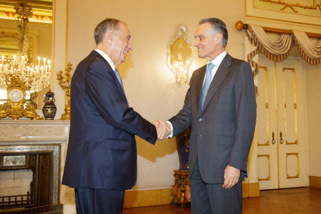

The President of the Republic enacted Parliamentary Bill no. 320/XII, which approves the “Second alteration to Law No. 62/98, dated 1 September, which rules the provision comprised in Article No. 82 of the Code on Copyright and Connected Rights, on the fair compensation regarding private copying”, and addressed a message to Parliament.
Following is the text of the Message from the President of the Republic:
“Having enacted, to be published as legislation, Parliamentary Decree No. 320/XII, which approves the «Second alteration to Law No. 62/98, dated 1 September, which rules the provision comprised in Article No. 82 of the Code on Copyright and Connected Rights, over the fair compensation regarding private copying» I believed I should address Parliament, in line with the provisions of item d) of Article No. 133 of the Constitution, the following message:
1. I enacted this Bill since it was confirmed by absolute majority of Members of Parliament in effective office, in accordance with the provisions of §2 of Article No. 136 of the Constitution.
2. Without prejudice to the bases contained in the message that accompanied the return, without enactment, of Decree No. 320/XII, there are factors that should have justified a rethinking of the solutions comprised in the now approved regime.
3. In effect, the Court of Justice of the European Union, in its recent judgement dated 5 March (C-463/12, Copydan Bândkopf), not only rejected that the adoption of fair compensation for private copying resulted from the imposing of Directive 2001/29/CE of the European Parliament and of the Council, dated 22 May 2001, but also asserted the need that national legislation should conform to the provisions of that Directive, limiting however the excesses of the law ruling private copying relative to fair compensation.
The Court of Justice of the European Union, in the referred judgement, asserted that, although the above Directive did not inhibit the approval of a law on private copying that imposed the obligation of fair compensation brought about by the acquisition of devices, such compensation is subject to very narrow limits.
In any case, it is unequivocal that States are widely free to approve, or not, legislation on this issue.
4. On another hand, the Commission addressed - on 6 May 2015 – a communication to the European Parliament, to the Council, to the Economic and Social Committee and to the Committee of the Regions, in which it defends a sole strategy for the European Digital Market.
In this document, the Commission states it commits itself to present, in 2015, legislative initiatives to achieve the objective, specifically in the field of digital portability, to establish clear rules for cross border data trade and measures of protection of intellectual property and author’s compensation.
In these terms I consider that, in the regulation of issues concerning private copying approved by Parliament, an adequate and balanced reasoning was not carried out considering all the interests in question, taking namely into consideration, the need to ensure an effective and real protection of the rights of authors and creative artists that would not imply unjustified costs for the consumers nor affect the development of the digital economy, a strategically important sector for Portugal in the context of great global competitiveness.
Palace of Belém, 25 May 2015”
© 2006-2016 Presidency of the Portuguese Republic
You have gained access to the records of the Official Site of the Presidency of the Republic from 9 March 2006 to 9 March 2016.
The contents available here were entered in the site during the 10 year period covering the two mandates of President of the Republic Aníbal Cavaco Silva.